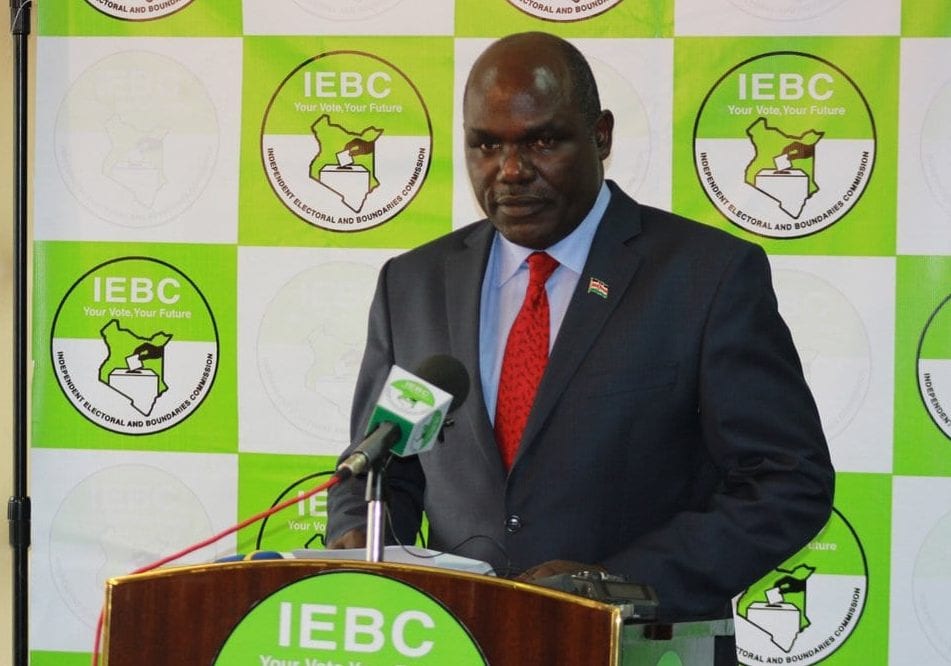Wafula Chebukati led Independent Electoral and Boundaries Commission (IEBC) have screwed the commission with the new election campaign financing rules.
According to IEBC, for you to contest in any political office next year, you must, among other things open campaign financing accounts, financing-expenditure committees and appoint authorised persons who will manage campaign funds, at least two months before elections.
The new rules are contained in the Campaign Financing Act 2013 which IEBC hopes to enforce ahead of the 2022 General Election scheduled for August 9 next year.

Why am I saying that IEBC and its chair Mr. Wafula Chebukati have middle-fingered themselves with the half-thought election financing rules?
First of all, the IEBC does not have the capacity or even the mechanism to enforce the rules. If you look at the Election Campaign Financing Act, 2013, it is fairly weak and the rules are a cliché. Ideally, there should be a very clear monitoring mechanism to ascertain how much has been received as well as the expenditure.
There are people who have been campaigning for the various seats for the last three years. So, at what point do you start monitoring or measuring the amounts they have spent in their campaigns?
The IEBC is giving us the rules as we speak yet the campaigns started a long time ago. Half of the people who are eying various seats are already campaigning.
“For us to be clear as a country, we ought to have very serious monitoring mechanisms from the onset. Politicians have been campaigning all along, they have been giving money in the churches, they have been chief guests in harambees to raise money for various causes. Politicians have also been meeting elders, professionals, influencers and the business community among others. All this is campaigning and huge amounts of money are spent. We know very well the presidential campaigns in Kenya could use many times more than the limit they have set.” Brian Weke says
Further still, an election is not an event— it is a process. This means spending started very early and therefore, monitoring should have started way back. You cannot monitor spending just for the period before the polls.
Telling politicians that these are the rules and warning them against spending more than the limit is a total waste of time. How do you ascertain that politicians will observe the limits?
“The strengthening of the rules ought to happen from the Act. The Election Campaign Financing Act, 2013 is a joke. You cannot have stronger rules than the Act. The commission must avoid knee-jerk rules that do not seek to look at the whole process of campaigns.” Brian Weke stated.

ELGIA (Electoral Law and Governance Institute for Africa) executive director Felix Odhiambo on Monday said the IEBC may not be able to clamp down on errant candidates.
“Coming one year to the elections, time is running out for putting in place enforcement mechanisms. It will be a challenge. It is even a problem in other jurisdictions,” the polls expert said.
The good news is that the commission has drastically slashed campaign spending for parties and candidates as it unveiled a Sh40 billion poll budget. In the new campaign financing limits published on Monday, the IEBC reduced the spending by presidential candidates from Sh5.2 billion to Sh4.4 billion
The spending limit is guided by the geographical size and population of a specific region Limits must be approved by Parliament. However, political parties will have their ceiling raised from Sh15 billion set in 2017 to Sh17.7 billion. The major parties will battle fiercely for numbers.
Parties participating in next year’s polls are allowed to spend Sh11 billion for transport, Sh1.8 billion for advertising, Sh945 million for administrative costs and Sh1.5 billion for poll agents.
In the 2022 campaign spending figures released on Monday, governors, senators and woman representatives will be allowed to spend a maximum of Sh123 million, down from Sh432 million allowed in 2017.
Kakamega governor Wycliffe Oparanya said the amounts could be too little considering the campaign work involved. He termed the figures a ‘big joke.’
“A figure like Sh59 million for Kakamega is very little, even for logistics only. That is the range you are likely to spend for the hiring of vehicle, fuel, and campaign teams alone,” he said.
















